If you own a dog, you may have already had the horrible experience of having your dog bite your nose. You might have questioned “Why does my dog bite my nose?” and whether it’s a sign of affection or aggressiveness.
You could have also been worried about the possibility of diseases or injury from a dog bite[1]. You are not alone. Nose biting is a common behavior among dogs, and it can have various meanings and causes.
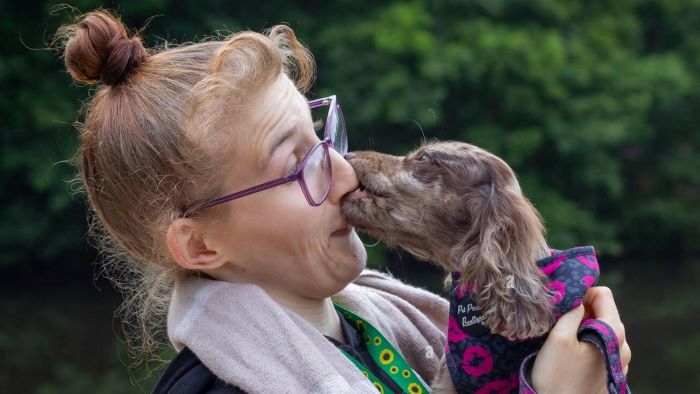
In this article, we’ll go over some of the causes of dog nose-biting as well as how to determine whether your dog is acting aggressively or just for fun. We will also provide you with some advice on how to control this behavior and how to handle a nose bite injury might it occur.
By the end of this article, you will have a better understanding of why your dog bites your nose, and what you can do about it. You will also learn how to improve your relationship with your dog, and avoid any unwanted or harmful consequences.
Contents
Why Does My Dog Bite My Nose?
One of the most important things to consider when your dog bites your nose is whether they are doing it for fun or for aggression. You may use this to decide how to respond and what penalties to impose.
Also, it can help you comprehend your dog’s feelings and intentions and prevent any misunderstandings or disputes. The signs of playful biting and aggressive biting[2] differ significantly, although they also share some characteristics.
Hence, you should pay attention to your dog’s body language, vocalization, and context when they bite you on the nose. We’ll discuss some signs of both playful and aggressive biting in this section, as well as how to respond to both.
1) Dog Bite Your Nose for Fun
Sometimes, your dog may bite your nose as a way of initiating or engaging in play. They may also do this to mimic the way they play with other dogs, who often nip each other’s muzzles during play.
Playful biting is usually soft and gentle, and does not cause pain or damage to the skin.
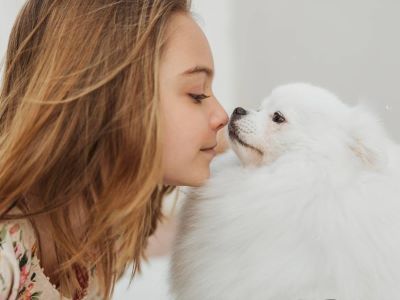
Some of the signs of playful biting are:
- Gentle nibbling: Playful biting is often pleasant and soft, and it doesn’t hurt or harm the skin.
- Wagging tail: A wagging tail, which denotes joy and enthusiasm, frequently goes along with playful biting.
- Relaxed body language: A relaxed and loose body position, which conveys ease and confidence, is typically used when playfully biting.
- Vocalization: Barking, whining, or growling, which are signs of communication and an invitation to play, may be heard with playful biting.
2) Dog Bite Your Nose Out of Aggression
In other cases, your dog may bite your nose to show hostility or fear. They might be doing this to test or caution you. Biting that is aggressive often comes hard and fast, and it can hurt or harm the skin. It could also be a symptom of deeper concerns or problems.
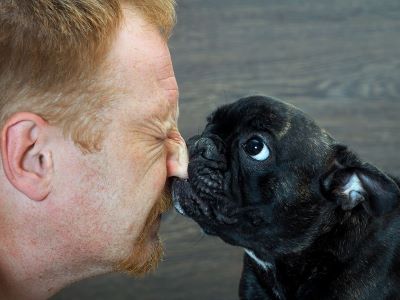
Some of the signs of aggressive biting are:
- Teething: Teething is a process that occurs when your dog’s baby teeth fall out and their adult teeth grow in. This usually happens between 3 and 6 months of age. During this time, your dog may experience pain, discomfort, or itching in their gums. This may cause them to bite your nose out of aggression, as a way of relieving their discomfort or expressing their frustration.
- Hard Biting: Aggressive biting is usually harsh and violent, it may hurt or harm the skin.
- Growling: Aggressive biting is a low-pitched growl that denotes danger and warning is typically present.
- Snarling: Aggressive biting is typically accompanied by a snarl that shows the teeth and conveys anger and rage.
- Stiff Body Language: Aggressive biting is frequently done with a rigid, tight body position that conveys fear and anxiety.
- Eye Contact: Aggressive biting is typically done so while making direct eye contact, which denotes challenge and dominance.
How Should You React If Your Dog Bites Your Nose?
If your dog bites your nose, you should react differently depending on whether they are doing it for fun or for aggression. Your reaction can affect how your dog learns and behaves in the future.
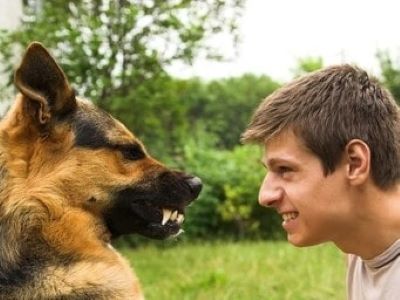
In this section, we will explain how you should react to playful biting and aggressive biting, and what consequences you should give.
1. Redirect Dog’s Attention: Their focus should be diverted to something else, such as a toy, a treat, or a command. They may learn from this that it’s impolite to bite your nose and that there are alternative appropriate forms of play and affection.
2. Ignore Your Dog: You should ignore them until they stop biting your nose. This can help them learn that biting your nose does not get them any attention or reward.
3. Praise Your Dog: You should praise them when they stop biting your nose. This can help them learn that not biting your nose gets them positive reinforcement.
4. Stay Calm: You need to maintain your composure and refrain from having an angry or frightened reaction. This may assist avoid escalating the conflict or inciting further anger.
5. Move Away: You should make some space between you and your dog. By doing so, you may ease the strain and allow your dog some privacy.
6. Seek Help: A veterinarian or a dog trainer might be a good choice for expert assistance. The finest remedies may be given to you as a result, and you can better understand the causes of your dog’s hostility.
Tips to Prevent Your Dog from Biting Your Nose
The best way to deal with your dog’s nose biting behavior is to prevent it from happening in the first place. This can help you avoid injury, infection[3], or discomfort, and also improve your relationship with your dog.
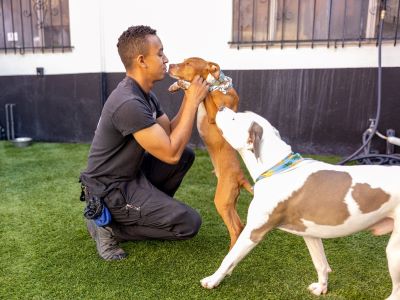
Some of the ways to prevent your dog from biting your nose are:
1) Socialize and Train Your Dog
To ensure that your dog learns how to act appropriately among humans and other animals, you should socialize and teach them from a young age.
You should expose them to a variety of circumstances, surroundings, and stimuli as well as teach them fundamental manners and directions.
2) Teach Your Dog Bite Inhibition and Impulse Control
To help your dog learn how to manage their biting force and urges, you should educate them on bite inhibition and impulse control.
You may accomplish this by rewarding them for being nice or quiet and utilizing toys, treats, clickers, or orders.
3) Provide Alternatives to Nose Biting
You have to give your dog alternatives to nose biting that can fulfill their requirements, such as licking, nuzzling, or snuggling.
You may also provide them with constructive ways to release their energy, including play, exercise, or brain stimulation.
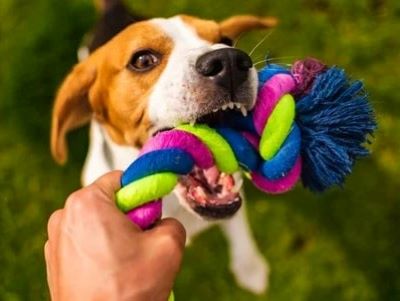
4) Maintain a Healthy and Happy Relationship with Your Dog
One of the goals of every dog owner is to have a healthy and happy relationship with their dog. This can improve the quality of life for both the owner and the dog.
In this section, we will share some tips on how to communicate clearly, set boundaries, and reward good behavior with your dog.
- Communicate Clearly: You should communicate clearly with your dog by using consistent verbal and non-verbal cues. This can help you establish trust and respect with your dog.
- Set Boundaries: You should set boundaries with your dog by enforcing rules and limits. This can help you teach your dog what is acceptable and what is not.
- Reward Good Behavior: You should reward good behavior with your dog by using praise, treats, toys, or attention. This can help you reinforce positive behavior and discourage negative behavior.
Treatments If a Dog Bite Injury Happens
Even if you try to prevent your dog from biting your nose, it may still happen accidentally or unexpectedly. In this case, you should know how to treat a nose bite injury if it happens.
Some of the steps to treat a nose bite injury are:
1. Seek medical attention: If the bite is severe, bleeding, or infected, you should consult a doctor. Stitches, antibiotics, or tetanus vaccinations can be required.[4]
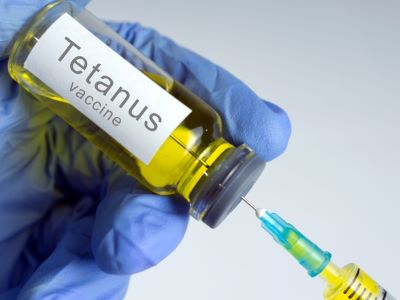
2. Clean and bandage the wound: If the wound is mild, you should clean and bandage it at home. The wound has to be cleaned with soap and water, pressure should be applied to stop the bleeding, an antiseptic cream or ointment should be used, and a sterile bandage should be placed over it.
3. Monitor the wound: For indications of infection or complications, such as redness, swelling, pus, fever, or discomfort, you should keep an eye on the wound. The wound should be kept dry and clean, and the bandage should be changed often.[5]
FAQs
What to do if a dog bites my nose?
You should first establish some space between yourself and the dog that bites your nose. Then, examine the incision to see whether it is bleeding, deep, or infected. When treating a small wound, you can bandage it up after washing it with soap and water and using an antimicrobial cream. Inquire from the dog’s owner about the dog’s history of vaccinations, particularly for rabies. You should obtain a rabies injection as a precaution.
Why does my dog keep biting my nose?
Your dog may keep biting your nose for various reasons, such as playfulness, affection, curiosity, boredom, or attention-seeking. You should try to prevent or stop this behavior by socializing and training your dog, teaching them bite inhibition and impulse control, providing them with alternatives to nose biting, and rewarding them for good behavior.
Why does my dog nibble my nose and ears?
Your dog could nibble your nose and ears as a way to show you how much they care. Like they did with their littermates or parents, they may even groom or clean you in this manner.
Why does my dog go to bite my face?
Depending on the situation, your dog could bite your face to start or join in on play if they are calm, wagging their tail, and vocalizing. Your dog may bite your face to show aggressiveness or fear if they are rigid, growling, snarling, and establishing eye contact. Your dog may bite you in an effort to seek your attention or to make you feel better if they are bored, lonely, or insecure.
Conclusion
Dogs may bite your nose for various reasons, such as fun, affection, dominance, or excitement. All of these reasons are really not favorable or acceptable, and some of them can point to underlying flaws or difficulties.
In this article, we have given you some tips on how to tell if your dog is biting your nose for fun or for aggression, how to prevent your dog from biting your nose in the first place, and how to treat a nose bite injury if it happens.
We have also shared some tips on how to maintain a healthy and happy relationship with your dog. We hope this article has helped you answer the question “Why does my dog bite my nose?” and has given you some useful information and advice.
Remember If you have any worries or queries regarding your dog’s behavior, you should always seek expert advice. Nose biting is not a common or healthy habit. Thank you for reading and have a great day with your furry friend!
References:
- Lin, W., & Patil, P. M. (2015). Facial Dog Attack Injuries. Indian Journal of Surgery.- NCBI
- Schade, V. (2023). Is Your Older Dog Becoming Aggressive? How to Handle Behavior Changes.- BeChewy
- Watson, S. (2009, November 10). Dog Bites. Retrieved June 12, 2023, from- WebMD
- Philadelphia, C. H. O. (n.d.). Rabies Vaccine. Retrieved June 12, 2023, from- CHOP
- Whelan, C. (2018, September 28). How to Treat a Dog Bite. Retrieved June 12, 2023, from- Healthline

Dania is a dog groomer living in California, who loves styling dogs. She often uses dog accessories to keep them distracted while grooming. She is also a dog parent to a Pomeranian, Duke. It’s because of him she is always on a lookout for the best dog foods, toys, other dog accessories, and ways to keep him equipped, healthy and happy.


